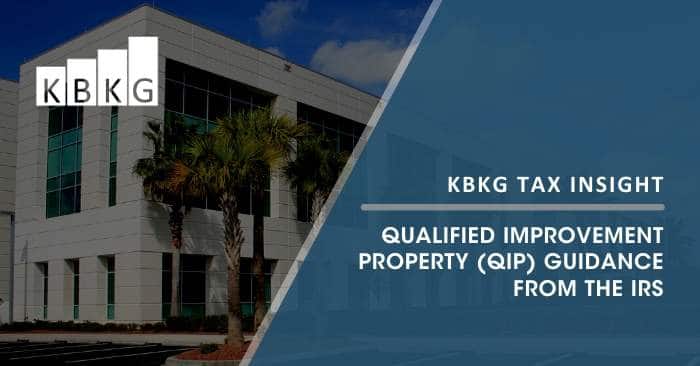


In response to our previous release last week, Qualified Improvement Property (QIP) Technical Correction in CARES Act, KBKG has received several inquiries related to the changes in QIP law. Since that post, we have also learned more through discussions with high ranking IRS officials in the Office of Chief Council. A revenue procedure specifically addressing QIP will be issued in the coming months to provide detailed guidance.
Q. Will this be an automatic accounting method change using Form 3115?
A. Yes! Since the law is amended retroactively, using a 39-year tax life for QIP is considered “impermissible” and therefore falls under Section 6.01 of Rev. Proc. 2019-43 (change #7 on IRS Form 3115).
KBKG Insight: Tax professionals must still check that the asset does not fall into any of the inapplicability provisions under Section 6.01(1)(c). For example, if a federal income tax credit (like the historic credit) was claimed on the asset, it is not eligible for an automatic change.
KBKG Insight: Remember, under the scope limitation rules in Rev Proc 2015-13, a taxpayer would not be eligible for this accounting method change if they have already filed the same type of change (#7 depreciation) on the same item in the last 5 years. It’s possible this rule is waived when guidance is issued.
Q. Are there any other options available for claiming missed QIP deductions, other than amending or filing a Form 3115?
A. According to a high-ranking IRS official in the Office of Chief Council, all options are being considered to simplify this process. This includes possibly allowing tax preparers to recalculate depreciation without a Form 3115 on the current year return.
Q. Why did lawmakers change the definition for QIP by adding language indicating the improvement must be made by the taxpayer? Will this impact landlords who provide tenant-allowances?
A. According to IRS officials who have discussed this question with those who drafted this law, the intent was to clarify that QIP paid for by a previous owner of a building is no longer considered QIP to the new owner. Furthermore, these IRS officials had no reason to think this change will affect landlords who provide tenant-allowances.
Q. Does this change affect QIP placed in service before 2018?
A. No. QIP placed in service before 2018 is 39-year property and eligible for bonus depreciation. See KBKG’s Qualified Improvement Reference Chart below for the most up to date resource on changes in QIP law.
Q. Do I still need a cost segregation study if most of the costs fall under QIP?
A. If you are not sure that all costs meet the QIP definition, contact a cost segregation professional to discuss the facts. For a nominal fee, a limited scope cost segregation study can separate QIP from structural components that must be depreciated over 39 years. Examples of non-qualifying costs include HVAC, building expansions, roof work, elevators/escalators, storefronts, structural work, and seismic retrofits, among others.
KBKG Insight: For higher taxed states that do not conform to bonus deprecation and require a 39-year tax life, cost segregation can make sense when interior improvements are significant. Cost Segregation also makes sense for taxpayers required to use a 20-year ADS life for QIP under 163(j). In this case, personal property identified is eligible for federal bonus depreciation.
Contact a KBKG specialist to discuss options on how to maximize depreciation deductions on your capital improvements. Our team is available to answer any questions you may have.
For more information on the recent changes to Qualified Improvement Property, see Qualified Improvement Property (QIP) Technical Correction in CARES Act.
You can download our Qualified Improvements Quick Reference Chart for an easy-to-use resource reflecting these new changes for free, by joining our mailing list. Download will be available immediately following submission: